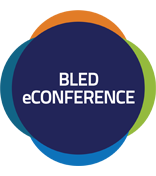The Bled Manifesto 2017
The Bled eConference has been shaping electronic interactions since 1988. Its community aims to actively contribute in shaping of economic and social growth, as well as raising wellbeing of citizens around the world. In 2004, Bled eConference issued the Bled Manifesto “Electronic Commerce: Setting the Agenda for Economic and Social Growth”. The Manifesto aimed for helping national leaders shape economic and social growth policy for exploiting e-commerce opportunities.
The evolution of digital technologies and solutions (e.g. Internet of things, artificial intelligence and advanced machine learning, virtual and augmented reality, big data & big data analytics, blockchain, high performance computing, service architecture, digital technology platforms, 3D printing, robotics etc.) has significantly impacted the way business is conducted. The Digital Economy calls for transformation of businesses, governments, education and societies. The Bled Manifesto 2017 is a declaration of policy and intent developed by the Bled Community from these four perspectives. Building on and taking further the original Bled Manifesto from 2004, it helps national leaders shape economic and social growth policy for exploiting opportunities in the Digital Economy. It consists of two parts, first a description of the current situation and trends is provided. Subsequently in the second (normative) part, recommendations are provided for achieving better economic and social growth and higher wellbeing of citizens around the world.
The Bled Manifesto 2017 was developed in the course of the 2017 Bled eConference during the Digital Forum sessions.
1. The Digital Economy: Current Situation and Trends
Government Perspective
Currently digital policies are already in place in most countries. But as digitalization is getting much more relevant and is reaching much more – basically all – areas of life of individuals as well as of any organization, digital policies get much more relevant today.
As technological development is quite fast and business models are dynamic, law should be less rigid and more flexible to leave room for innovations. Simultaneously there is increasing demand for data protection and privacy regulation in terms of data access, usage conditions of (personal) data, and the fairness of data usage. However, sustainable solutions need room and time for experimentation and trials – they hardly can be successfully designed at a policy makers’ desk alone. As can be observed from the media industry, where the urgency of a reassessment of digital property rights have been brought to the center of attention already at the beginning of the millennium by companies like Napster or Kazaa, it takes time until the legal framework converges to enable services like Spotify or Apple Music. It took 10 years after the foundation of Napster, in 2009, before the European Parliament voted on changes to the Telecoms Package and with regard to file-sharing agreed to compromise between protecting copyright and protecting user’s rights. A European Parliament statement reads “A user’s internet access may be restricted, if necessary and proportionate, only after a fair and impartial procedure including the user’s right to be heard.”
Education Perspective
Driven by the technological and societal changes in past years the question: ‘What knowledge and skills do we need to teach in order to help transform (industry and society) and to enhance quality of life?’ needs to be addressed.
Current educational models are focusing on general and domain specific knowledge, often neglecting skills needed for active participation in the fast changing society. Furthermore, the need for life-long learning is still not adequately addressed. Curriculums on all levels are rigid, and the gap between formal educational systems and informal training & coaching is widening. The dilemma on the need for formative knowledge versus soft skills has been discussed for a long time, especially in technical vs business schools, and academia vs business setting; yet still remains unresolved. There is clear need to create such curriculums that would prepare people of all ages for future jobs in which different competences are needed.
Business Perspective
As stated, digital technologies have a significant role in all parts of our society. Beside numerous opportunities, their implementation is also associated with various challenges. The speed of change is enormous and for many enterprises, governments, education institutions, citizens and society as a whole hard to follow. Many enterprises struggle with finding the proper strategies for digital transformation.
Enterprises, no matter the size and industry, are facing different challenges and search for the most suitable ways for successful digital transformation. For example, SMEs often struggle with lack of awareness, resources, skills and knowledge and are strongly focused on their core business and less aware of opportunities of digital technologies. On the other hand, large traditional enterprises have difficulties becoming more flexible to implement novel technologies and change from traditional ways of doing business to new business models.
Overall the current situation calls for faster transformation of working environments and faster evolvement of digital transformation enabling policies.
Citizen Perspective
Here the three perspectives above come together. It is the individual that works in businesses and government, and that provides education as well as pursues it. Individuals have the opportunity to increase efficiency and effectiveness by adopting digitalization in everyday life. However, we need to be cautious when using ICT. We need to identify and manage negative impacts, disproportionate impacts, and inequitable impacts of digitalization. More data is needed for making decisions.
Dependencies from ICT and data increase. This means both opportunities and threats. Digitalization often causes loss of trust. In the past, we received information from a small number of sources, now there are many sources and we don’t always know which can be trusted. With all the fake news and information overload, how can individuals/citizens prepare themselves better to sort through facts? How can ICT, especially AI and cognitive science, be used to support decision-making? Also, the risk of war over cyberattacks is increasing.
The individualization is a risk for democracy. Technology has changed the way people think. A majority of individuals have concerns about privacy. Privacy is lost because data about everyday activities is collected and monitored by companies and institutions. Still, people are more willing than ever to share data.
Profound changes in the value system are needed to benefit from ICT. Technology itself does not guarantee, but can facilitate and provide a means for happiness. For example, virtual life can fill gaps where real life fails, digital entertainment games can give some sort of satisfaction, online groups, forums, interests can provide emotional comfort, healthcare can benefit from the usage of ICT. Human beings have multiple needs, ranging from physical to intellectual and mental. Maslow’s hierarchy of needs is an appropriate basis for considering the objectives against which impacts of digitalization should be assessed. There are many other problems in the world, such as hunger and diseases. The lack of availability of data means a shift of the traditional meaning of a less developed world.
2. Policy Agenda: Recommended actions for achieving better economic and social growth and higher wellbeing of citizens around the world
Government
Currently both politicians and civil servants lack the necessary skills as well as foresight to guide their countries during the current digital transformation. Due to this, governments are missing awareness on both the positive and possible negative outcomes of digital transformation. Therefore, we find that policy makers should be much more proactive in devising new regulations and new perspectives on law, should be more responsive to adequately support transformation and innovation (and not hinder them) and prepare the ground for societies as well as businesses and individuals. Policy and law making should be done with a stronger emphasis on seeing the issues from the individual perspective (as opposed to the business/organization perspective). Specific areas of attention are data protection, security and privacy as well as the impact on critical infrastructure. It is important to support disruptive business models while also considering existing traditional enterprises and businesses, policies and laws should provide a fair environment for both.
Education
As it is already clear that many of today’s jobs will no longer exist in the future the current educational system with its focus on domain specific skills needs to change. It is necessary to rethink how we value teachers’ work, revenue and cost models – the whole business model. This should be done in cooperation with all stakeholders – students, teachers and policy makers. First of all, it is imperative to educate the educators on the impact of technology on society and how this should be reflected in the classroom. A mix of teaching (and coaching) styles is necessary to prepare students (of all ages) to be able to participate in solving complex societal problems and develop creative and innovative solutions. To this end a curriculum redesign is required to make education more personalized and with an emphasis on 21stcentury skills instead of focusing on specific job skills. Furthermore, not only educators but also students/citizens should recognize that the need for lifelong learning is essential and this in turn should be supported through awareness raising campaigns by policy makers.
Business
In comparison to 2004 the speed and complexity of change has increased tremendously. Businesses can’t only rely on government and education to provide them with the right environment and supply of professionals to counter the challenges they are confronted with. To prepare for the digital transformation management should increasingly be aware of technology developments and be prepared to change their organizations culture accordingly. Organizations need to experiment with different business models and new forms of organization that are part of networked ecosystems. Furthermore, organizations must invest in the digital competencies of their employees and support them in experimentation, accepting the fact that failure is an important way of learning. Building up trust and loyalty within the organization as well as with partners is essential to survive in a digitized world.
Citizens
In an increasingly digitalized life, people without basic technology skills will not be able to participate in society, which will cause a digital divide. Citizens should be educated (and educate themselves) in areas such as the use of (government, educational, healthcare etc.) services via the Internet and Apps, data and information quality, security and privacy. It is important to be able to reflect on information and comprehend the working of algorithms (filtering of data and information) to determine which sources can be trusted. Furthermore, citizens should be able to understand the debate on the trade-off between liberty and repression, human rights versus safety. Finally, citizens should realize the implications of sharing data online even if their rights to privacy are protected by law.
Overall and even if presented as different perspectives, it is important to realize that the complex challenges posed by the dynamic evolution of digital technologies and solutions in all aspects of our lives can only be mastered by an integrated, interdisciplinary approach. The Bled Community thus calls for increased collaboration and co-operation of all stakeholder groups in order to define and implement border-spanning measures that adequately address the global challenges presented above. To reach this goal the Bled eConference/Digital Forum serves as a nucleus and means of bringing people from the various backgrounds together.


